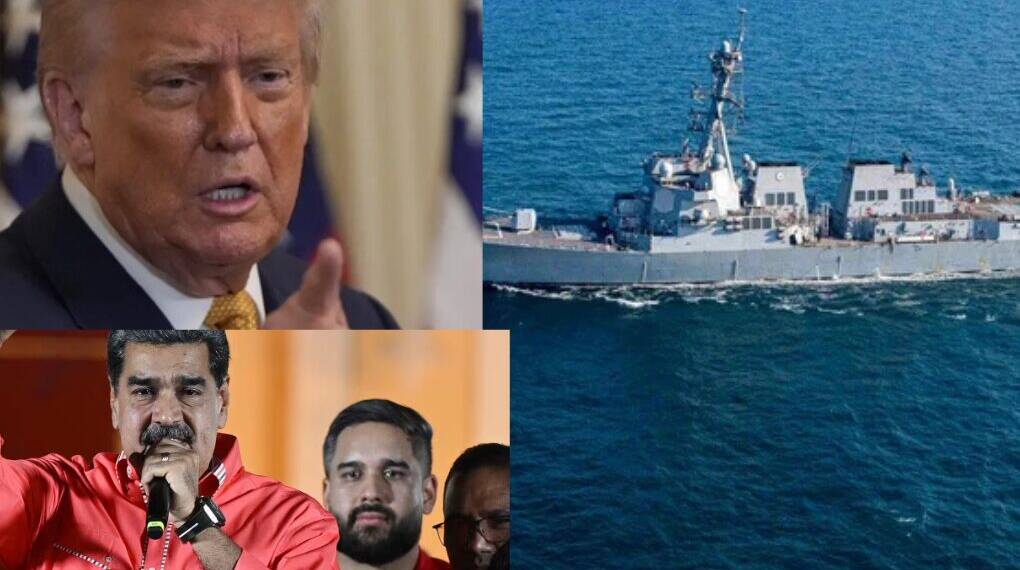The deployment of U.S. warships to waters off Venezuela marks a dramatic escalation in tensions between Washington and Caracas, as President Donald Trump openly accuses Nicolás Maduro of narco-trafficking and cartel collusion.
While officially framed as a counter-narcotics operation, the move raises the prospect of a wider military confrontation that could destabilize Latin America and trigger global geopolitical ripples.
U.S. Warships Sail Toward Venezuela
In August 2025, the U.S. confirmed it is sending three Aegis guided-missile destroyers—the USS Gravely, USS Jason Dunham, and USS Sampson—to the Caribbean, off Venezuela’s coast. According to officials, the destroyers will remain in the region “over the course of several months” as part of expanded counter-narcotics efforts.
The deployment is part of Trump’s broader push to use military assets against Latin American cartels, which he has designated as foreign terrorist organizations—a label usually reserved for extremist groups like al-Qaeda and ISIS. Trump has also doubled the U.S. reward for Maduro’s arrest to $50 million, accusing him of being one of the world’s largest narco-traffickers.
While officially a counternarcotics mission, many analysts see the naval deployment as a pre-invasion maneuver. The presence of warships allows the U.S. to enforce blockades, launch precision strikes, and support amphibious landings if Trump escalates toward regime change.
Maduro’s Response: Militias Mobilized
Venezuela’s leadership has dismissed Washington’s accusations as baseless. Foreign Minister Yván Gil accused the U.S. of hypocrisy, arguing that its “threats reveal the failure of its policies in the region.” Meanwhile, Maduro announced the deployment of more than 4.5 million civilian militias across Venezuela to bolster defenses against possible external attacks.
These militias, created by Hugo Chávez, are poorly equipped but ideologically loyal. They could form the backbone of a prolonged guerrilla resistance if U.S. forces attempt an invasion. The Venezuelan government has also temporarily banned drones nationwide, citing past assassination attempts against Maduro.
Immediate Military Consequences
If Trump were to greenlight a full-scale invasion, U.S. forces would likely achieve a rapid initial victory. Venezuela’s conventional military is underfunded, with limited capacity to resist a coordinated U.S. naval-air campaign. Destroyers off the coast would provide firepower to neutralize Venezuela’s air defenses and secure maritime dominance.
Yet, Venezuela could quickly pivot to asymmetric warfare. With militias mobilized and loyalist paramilitary groups embedded in urban areas, Caracas could become the stage for a long and bloody insurgency. The U.S. might win the battle but risk losing the war.
Regional and Global Implications
Latin America: While Colombia and Brazil might quietly support Washington, most of the region—including Mexico—would denounce the intervention as a violation of sovereignty. A new refugee crisis could send millions fleeing into neighboring states, destabilizing already strained borders.
Russia and China: Both nations have significant stakes in Venezuela. Russia has supplied arms and military advisers, while China has invested billions in oil and infrastructure. Though unlikely to send troops, Moscow and Beijing could respond by providing advanced weapons, cyber support, or by escalating against U.S. interests in Europe and Asia.
Oil Shock: Venezuela holds the world’s largest proven oil reserves. Any blockade or sabotage could push global energy prices sharply higher, further destabilizing markets.
Humanitarian Risks
Civilian casualties, disrupted supply chains, and infrastructure destruction would worsen Venezuela’s existing crisis. Already, over 7 million Venezuelans depend on humanitarian aid, and an invasion could transform economic collapse into a full-scale catastrophe.
U.S. Domestic Backlash
Trump frames his hardline stance as a “war on cartels,” portraying Maduro as a narco-dictator allied with gangs like Tren de Aragua and MS-13. While this rhetoric appeals to some voters, a drawn-out occupation could fuel anti-war protests at home. Having just wound down two decades of conflict in the Middle East, Americans may be reluctant to support another costly foreign entanglement.
Possible Scenarios
Best Case: Maduro is quickly removed, a transitional government takes power, and Venezuela’s oil exports resume under international supervision.
Worst Case: Venezuela descends into insurgency, militias wage urban guerrilla war, Russia and China escalate globally, and the U.S. is trapped in another Iraq-style quagmire.
Most Likely: U.S. warships ensure initial victory, but Venezuela remains fractured between a U.S.-backed administration and pro-Maduro resistance, draining resources and destabilizing the region.
The deployment of U.S. destroyers off Venezuela has raised fears that Trump may be laying the groundwork for an invasion. While Washington insists the move targets narco-cartels, the rhetoric, naval buildup, and militia mobilization in Caracas suggest preparations for something much bigger. If war comes, it will not only reshape Venezuela but also deepen the Russia-China-U.S. rivalry, disrupt oil markets, and risk dragging America into another protracted foreign conflict.








